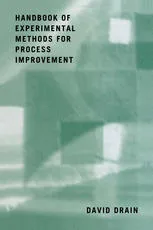Handbook of Experimental Methods for Process Improvement
4.9
Reviews from our users

You Can Ask your questions from this book's AI after Login
Each download or ask from book AI costs 2 points. To earn more free points, please visit the Points Guide Page and complete some valuable actions.Introduction to the Handbook of Experimental Methods for Process Improvement
Welcome to the Handbook of Experimental Methods for Process Improvement, a comprehensive guide crafted to empower professionals, researchers, and organizations with the tools and techniques needed to enhance their processes systematically. Whether you are a project manager seeking to streamline workflows, an engineer aiming to optimize manufacturing lines, or an analyst looking to eliminate inefficiencies, this book serves as your go-to resource for data-driven experimental approaches. Filled with practical insights, proven methodologies, and actionable examples, it bridges the gap between theory and real-world application.
This handbook provides a step-by-step roadmap for understanding and implementing experimental tools, such as Design of Experiments (DOE), Statistical Process Control (SPC), and Lean Six Sigma principles. It focuses on demystifying complex methods, ensuring they are accessible to beginners while remaining invaluable to seasoned professionals. By reading this book, you’ll discover how to harness the power of experiments not only to solve technical challenges but also to drive organizational growth and efficiency.
Detailed Summary of the Handbook
Structured to align with the needs of modern process improvement practitioners, the book begins with an overview of why experimental methods are essential for driving sustainable improvements. The first section covers fundamental concepts, including the scientific approach to problem-solving, the importance of data, and the foundational principles of hypothesis-driven experimentation.
The focus then shifts to practical strategies and tools. You’ll learn core techniques like factorial design, ANOVA (Analysis of Variance), and response surface methodology, all explained with relatable examples. The book systematically introduces simple methods, such as Pareto analysis and Ishikawa diagrams, before advancing to multivariate analysis, simulation, and regression modeling. It also includes real-world case studies from industries such as healthcare, manufacturing, and software development.
Beyond the technical aspects, the book addresses critical process elements, such as fostering stakeholder buy-in, building cross-functional teams, and nurturing a culture of continuous improvement. Additionally, it provides guidance on how to interpret experimental results effectively, ensuring that your insights translate into measurable and meaningful changes.
Key Takeaways
- Understand the principles and essential techniques of experimental design and analysis.
- Learn how to identify, define, and prioritize improvement opportunities in processes.
- Master statistical methods like ANOVA and regression to draw actionable insights from data.
- Explore case studies and examples that demonstrate real-life applications of experimental methods.
- Gain tips and strategies for overcoming challenges, such as resistance to change or data limitations.
Famous Quotes from the Book
"Every improvement begins with a question—what can be done better, faster, or smarter?"
"Experimentation is not trial and error; it’s a structured journey toward understanding and excellence."
"Data is the light that illuminates inefficiencies and guides you toward solutions."
Why This Book Matters
In today’s rapidly evolving business landscape, the ability to adapt and improve processes is a critical differentiator. Organizations face constant pressure to enhance quality, reduce costs, and deliver value faster. This book equips you with a proven framework for meeting these challenges head-on. By emphasizing a systematic approach to experimentation, it allows you to make evidence-based decisions, minimize risks, and achieve sustainable results.
Most importantly, the methodologies outlined in this handbook are not limited to a specific industry or role—they are universally applicable across sectors and functions. In a world increasingly reliant on data, mastering experimental methods is no longer optional; it’s a necessity. This book is your guide to embracing that necessity and transforming it into a competitive advantage.
Begin your journey into the world of process improvement today and become a champion of data-driven excellence. The Handbook of Experimental Methods for Process Improvement is your trusted companion in driving meaningful change, one experiment at a time.
Free Direct Download
Get Free Access to Download this and other Thousands of Books (Join Now)
For read this book you need PDF Reader Software like Foxit Reader


